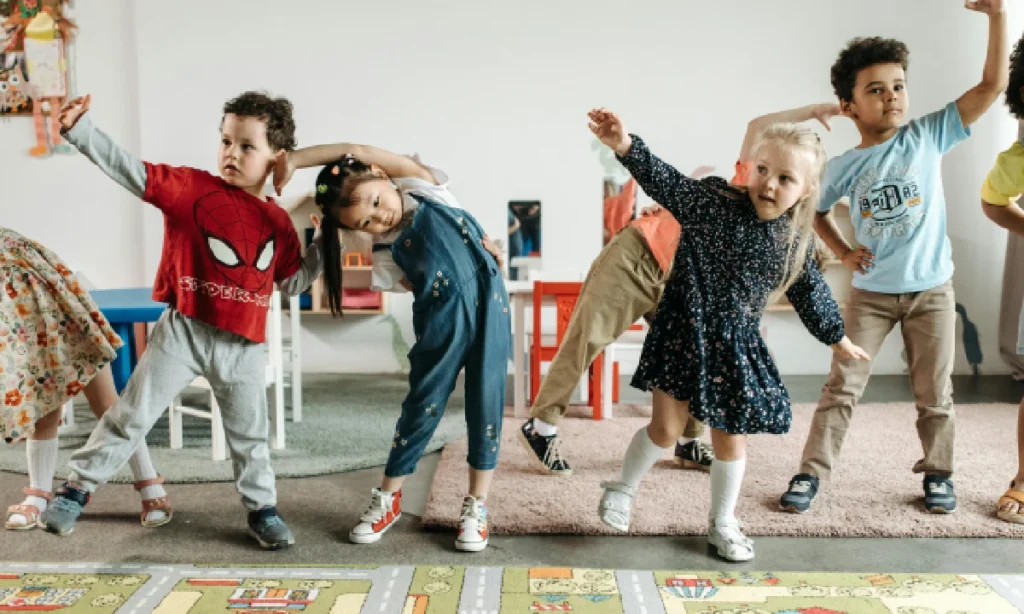![Murfreesboro Day School: 5 Powerful Ways Playtime Sparks Lifelong Learning Introduction: Redefining Play in Early Education At Murfreesboro Day School, the concept of play is elevated far above the traditional view of recreational downtime. It is intentionally integrated into the […]](https://dayschools.org/murfreesboro/wp-content/uploads/sites/3/2025/05/Day-School-4.webp)
Table of Contents
Introduction: Redefining Play in Early Education
At Murfreesboro Day School, the concept of play is elevated far above the traditional view of recreational downtime. It is intentionally integrated into the curriculum as a dynamic vehicle for cognitive, social, and emotional development. This philosophy is embedded in every aspect of the learning environment, where classrooms are transformed into laboratories of exploration and interaction. The educators recognize that for young learners, the most meaningful education emerges not through rote memorization, but through experiences that engage both the heart and the mind.
This redefinition of play serves as a counterpoint to the outdated perception that serious learning must be devoid of fun. At Murfreesboro Day School, students engage in carefully crafted activities that stimulate natural curiosity while aligning with age-appropriate developmental milestones. For example, a simple activity like building with blocks becomes a lesson in geometry, balance, and teamwork. Dramatic play transforms into narrative development, emotional processing, and social negotiation. In this setting, play is not a break from learning—it is the very process through which learning unfolds.
Furthermore, the school’s commitment to redefining play reflects its broader mission to develop the whole child. The learning model does not compartmentalize intellect from imagination or logic from creativity. Instead, it nurtures them simultaneously, fostering well-rounded individuals capable of critical thought, empathy, and innovation. This holistic approach ensures that Murfreesboro Day School graduates emerge not just academically prepared, but equipped with the adaptive skills essential for thriving in a complex, evolving world.
The Neuroscience of Play: Wiring the Brain for Growth
Scientific insights into early childhood development reveal that the brain undergoes its most rapid and critical formation during the first five years of life. Play, as it turns out, is a neurological catalyst during this period. At Murfreesboro Day School, educators design play-based learning environments that leverage these insights. Through hands-on exploration, children form and strengthen neural pathways associated with attention control, spatial awareness, and problem-solving. This intentional stimulation of the brain’s plasticity sets a strong foundation for advanced academic abilities later in life.
Within the structured freedom of Murfreesboro’s classrooms, play serves as a mechanism for activating multiple regions of the brain simultaneously. Activities like storytelling, construction play, or scientific exploration engage the prefrontal cortex, which governs executive functions such as planning, inhibition, and mental flexibility. Concurrently, sensory-rich experiences enhance the hippocampus’s role in memory formation. The interplay of these cognitive domains—when harnessed through purposeful play—results in robust, integrated learning that transcends traditional lecture-based models.
Another critical dimension of the neuroscience of play is its impact on stress regulation. Cortisol, the body’s stress hormone, is known to inhibit cognitive performance when chronically elevated. Play, particularly when free of pressure and imbued with joy, activates the brain’s reward systems, releasing dopamine and endorphins that promote well-being and emotional balance. Murfreesboro Day School’s nurturing atmosphere capitalizes on this neurochemical effect, enabling children to learn in a state of emotional safety and cognitive receptivity.
The school’s application of these neuroscientific principles is both proactive and strategic. Educators are trained to identify developmental windows—moments of heightened receptivity for specific skills—and tailor learning opportunities accordingly. Whether it’s enhancing spatial reasoning through puzzle-based activities or boosting verbal fluency through dramatic reenactments, each play encounter is designed with neural development in mind. The result is a deeply enriched educational experience that not only accelerates brain growth but also instills a lifelong enthusiasm for inquiry.

Social Intelligence through Structured Play
Social development is a cornerstone of early childhood education, and at Murfreesboro Day School, structured play is the vehicle through which it is most effectively cultivated. In guided scenarios like cooperative games and dramatic role-play, students encounter the complexities of human interaction in real time. These experiences allow them to practice and refine essential skills such as listening, turn-taking, and conflict resolution. Within these rich social ecosystems, children are not only learning how to relate to others—they are learning how to understand themselves in relation to a group.
Murfreesboro’s educators structure play with intentionality, ensuring that activities are not only fun but developmentally rich. Each group endeavor is designed to present age-appropriate social challenges and opportunities. For instance, building a structure with peers necessitates compromise, patience, and negotiation, while engaging in a pretend family scenario demands empathy, role differentiation, and emotional insight. These layers of interaction, scaffolded carefully by trained educators, build a foundation for social fluency and ethical behavior.
Importantly, the school’s approach balances autonomy with facilitation. Children are encouraged to make choices and take initiative, but teachers remain nearby to observe, guide, and gently intervene when necessary. This equilibrium empowers students to develop independence while benefiting from adult modeling and redirection. By navigating social situations in this supported environment, children become adept at interpreting social cues, resolving disagreements constructively, and adapting to group norms—skills that are indispensable in both academic and real-world settings.
Moreover, the cultivation of social intelligence through play at Murfreesboro Day School goes beyond mere cooperation; it nurtures leadership. Children learn how to inspire peers, delegate roles, and manage group dynamics. These experiences prepare students not only to succeed within a team but also to contribute meaningfully as future leaders. In today’s interconnected world, such interpersonal agility is not optional—it is essential.
Language Acquisition in Interactive Environments
Language flourishes in environments where expression is both encouraged and contextualized. At Murfreesboro Day School, play-based learning provides a linguistically rich tapestry where words have purpose, tone conveys emotion, and stories come alive. Whether children are immersed in imaginative role-play or participating in collaborative storytelling, each interaction presents an authentic opportunity to expand vocabulary, master sentence structure, and build verbal confidence.
Pretend play, in particular, is a potent catalyst for language acquisition. When a child becomes a firefighter, shopkeeper, or veterinarian, they adopt new lexicons and experiment with syntax reflective of those roles. This kind of embodied learning makes language deeply personal and memorable. Murfreesboro educators enhance these experiences by subtly introducing new terms, asking open-ended questions, and modeling complex language, all while maintaining the flow of child-directed play.
Beyond pretend play, the school integrates daily storytelling sessions and group dialogues into its routine. These communal experiences allow children to hear diverse speech patterns, explore narrative structure, and practice attentive listening. In peer conversations, they gain exposure to varied perspectives and speaking styles, which enhances both expressive and receptive language abilities. The focus is not only on what is said but how it is said—intonation, rhythm, and nonverbal cues are all part of the learning process.
Importantly, the school’s approach is inclusive and adaptive. Language development activities are tailored to meet each child at their individual level, including those who are multilingual or facing speech delays. The goal is to create a dynamic linguistic environment where every voice is valued and every child feels capable of meaningful communication. This fosters not only academic readiness but also self-assurance in one’s ability to connect with the world through language.
Emotional Resilience from Risk-Taking Activities
Emotional resilience is the quiet strength that allows individuals to face adversity with composure and adaptability. At Murfreesboro Day School, this trait is not left to chance—it is cultivated intentionally through a thoughtfully designed curriculum that includes safe, age-appropriate risk-taking. These challenges, embedded in daily activities, push children slightly beyond their comfort zones, fostering a sense of mastery and internal fortitude.
Physical play offers frequent opportunities for such growth. Climbing a previously unreachable height, attempting a balance beam, or navigating an unfamiliar obstacle course requires courage and perseverance. Each success boosts self-efficacy, while each stumble is reframed as part of the learning process. Educators are keenly aware that the goal is not avoidance of failure, but rather the development of coping strategies that transform setbacks into stepping stones.
Cognitive and social risks are equally emphasized. Tackling a complex puzzle, expressing a dissenting opinion during a group discussion, or initiating play with a new peer all require emotional vulnerability. Murfreesboro Day School’s supportive environment ensures that children can take these risks without fear of ridicule or exclusion. Teachers model empathy, validate emotions, and coach students through moments of frustration or self-doubt, building a robust emotional toolkit that includes patience, persistence, and reflection.
Ultimately, the resilience nurtured at Murfreesboro Day School extends far beyond the playground. It prepares children to navigate the inevitable uncertainties of life—academic transitions, social complexities, and personal challenges—with confidence and grace. In learning that discomfort is not a signal to retreat but a precursor to growth, students develop a mindset that equips them for lifelong learning and emotional wellness.

Cognitive Agility: Games that Sharpen Critical Thinking
Cognitive agility—the capacity to think clearly, adapt quickly, and problem-solve under varying conditions—is a hallmark of a well-rounded learner. At Murfreesboro Day School, the cultivation of this skill begins early, and play is its primary conduit. Whether students are analyzing a game’s rules, identifying visual patterns, or manipulating shapes to fit within a design, they are constantly engaging in tasks that enhance their mental dexterity. These exercises build the scaffolding for more complex reasoning in later academic settings.
The curriculum includes a wide spectrum of logic-based and spatially driven activities. Board games teach sequencing, memory, and cause-effect relationships, while construction-based play—such as using wooden blocks or magnetic tiles—requires spatial reasoning, symmetry, and structural planning. Each activity demands that children evaluate outcomes, revise their strategies, and iterate solutions. This iterative process enhances their metacognitive abilities—their capacity to reflect on their own thinking and adjust it as needed.
Cognitive play at Murfreesboro Day School is not random but intentionally layered with increasing levels of complexity. Younger children may begin with simple matching games and progress toward multi-step challenges that require anticipation, deduction, and symbolic thinking. Group problem-solving exercises are particularly effective, as they add an element of social cognition—requiring children to evaluate not only their own ideas but also the logic of others. This nurtures critical listening and respectful debate, key components of intellectual growth.
The broader aim is to equip students with a cognitive toolkit that prepares them for an evolving academic landscape. By fostering flexible thinking through play, Murfreesboro Day School students are better able to handle abstract concepts, decode unfamiliar problems, and persist through cognitive challenges. The ability to pivot strategies, question assumptions, and innovate solutions is not merely academic preparation—it is preparation for life.
Physical Play as a Catalyst for Focus and Discipline
While physical activity is often viewed as a release valve for excess energy, Murfreesboro Day School approaches it as a core component of cognitive and behavioral development. Physical play is meticulously integrated into the daily schedule, not just for bodily health, but for its proven impact on focus, regulation, and academic discipline. Movement stimulates the brain, modulates emotion, and conditions the body to sustain attention—foundational traits for successful learning.
Fine motor development is also prioritized. Activities like cutting with scissors, threading beads, or using small construction tools enhance dexterity and precision. These actions strengthen neural pathways associated with control and planning, both of which are essential for writing, sequencing, and logical problem-solving. Teachers at Murfreesboro Day School carefully observe each child’s motor development and adjust challenges to ensure progressive mastery.
Ultimately, physical play becomes a training ground for internal discipline. The ability to follow multi-step directions, persist through physically demanding tasks, and manage impulses during competitive play mirrors the executive functioning required in academic settings. By embedding discipline within joyfully engaging movement, Murfreesboro Day School transforms physical activity into a powerful medium for cultivating focus, resilience, and goal-directed behavior.
Teacher-Facilitated Play: The Role of Guided Discovery
The educators at Murfreesboro Day School are far more than supervisors—they are facilitators of transformational learning experiences. Rather than dictating outcomes or micromanaging activities, teachers employ a technique known as guided discovery. This pedagogical strategy involves subtly steering children’s exploration through inquiry, encouragement, and timely intervention, allowing students to uncover concepts organically while remaining aligned with clear developmental goals.
This approach begins with strategic observation. Teachers attentively monitor how children interact with materials, peers, and ideas, looking for moments of curiosity, hesitation, or breakthrough. From there, they pose thought-provoking questions—“What do you think will happen if…?”, “Why did you choose that method?”, “Can you try it a different way?”—that prompt deeper analysis and richer engagement. These questions serve as catalysts, nudging children beyond surface-level engagement into authentic learning territory.
Moreover, guided discovery fosters confidence and autonomy. Children learn that their ideas are valid, that struggle is part of the process, and that exploration leads to insight. They begin to see themselves as capable thinkers, not just passive recipients of knowledge. At Murfreesboro Day School, this educator-guided approach bridges the gap between free play and formal instruction, resulting in empowered learners who are both self-directed and intellectually grounded.

Parental Partnerships: Extending Learning Beyond the Classroom
The educational journey of a child is most effective when supported by a cohesive alliance between school and home. At Murfreesboro Day School, this partnership is both intentional and proactive. Recognizing that learning does not conclude with the school day, the institution places a strong emphasis on empowering parents to continue play-based learning in domestic settings. By creating a shared educational language and vision, the school ensures that the developmental gains achieved in the classroom are reinforced and expanded upon at home.
To facilitate this connection, Murfreesboro Day School offers a variety of parent engagement initiatives. These include interactive workshops on child development, play theory, and behavior management strategies that align with the school’s philosophy. Parents leave equipped not only with knowledge but with practical tools for implementation. Additionally, the school provides take-home activity kits that mirror classroom themes—complete with instructions, materials, and suggested dialogue prompts—allowing families to engage in purposeful play together.
Perhaps most importantly, Murfreesboro Day School fosters a culture where learning is viewed as a family value, not just a school mandate. When children see their parents actively participating in their educational experiences—whether by reading a story, assembling a science project, or role-playing a new character—they internalize the idea that learning is both important and enjoyable. This modeling reinforces curiosity, initiative, and a growth mindset that will sustain them well beyond the early years.
Conclusion: From the Playground to Lifelong Success
At Murfreesboro Day School, play is not an addendum to education—it is the heartbeat of the institution’s pedagogical philosophy. Every game, every story, and every spontaneous moment of imagination is harnessed as an opportunity to build character, intellect, and capability. This comprehensive integration of play into the learning framework ensures that children develop not only foundational academic skills but also the emotional and cognitive tools necessary for long-term success.
The school’s focus on play yields more than immediate developmental benefits. It instills a set of dispositions—resilience, creativity, collaboration, and empathy—that form the bedrock of lifelong achievement. Children who learn through play are not only more engaged but more adaptable, able to face challenges with confidence and respond to complexity with innovative thinking. These are the competencies that define thriving individuals in the 21st century.
Moreover, the ripple effect of Murfreesboro Day School’s model extends well beyond its students. By equipping parents, collaborating with families, and nurturing a culture of intentional learning, the school becomes a hub of community development. The habits of inquiry and joy cultivated in early childhood radiate outward, influencing families, future schools, and ultimately society at large. Education becomes not merely preparation for life—it becomes a way of living.
As students move forward from Murfreesboro Day School’s carefully crafted environment, they carry with them more than knowledge; they carry a deep-seated belief in their own ability to learn, grow, and contribute meaningfully to the world. In this sense, the playground is not just where education begins—it is where a lifetime of possibility is born.





